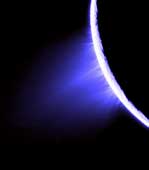|
COMETS EARTH JUPITER KUIPER BELT MARS MERCURY METEORITES NEPTUNE OORT CLOUD PLUTO SATURN SOLAR SYSTEM SPACE SUN URANUS VENUS ORDER PRINTS
PHOTO CATEGORIES SCIENCEVIEWS AMERICAN INDIAN AMPHIBIANS BIRDS BUGS FINE ART FOSSILS THE ISLANDS HISTORICAL PHOTOS MAMMALS OTHER PARKS PLANTS RELIGIOUS REPTILES SCIENCEVIEWS PRINTS
|
Related Document
Download Options
Cassini imaging scientists used views like this one to help them identify the source locations for individual jets spurting ice particles, water vapor and trace organic compounds from the surface of Saturn's moon Enceladus. Their study -- published in the Oct. 11, 2007, issue of the journal Nature -- identifies eight source locations, all on the prominent tiger stripe fractures, or sulci, in the moon's south polar region. Some of the sources occur in regions not yet observed by Cassini's composite infrared spectrometer, and the researchers predict that future Cassini observations of those locations will find elevated temperatures. This false-color view was created by combining three clear filter images taken at nearly the same time as PIA07759. This image product was then specially processed to enhance the individual jets that compose the plume. (PIA07759 was instead processed to reveal subtleties in the brightness of the overall plume that comprises the jets.) Some artifacts due to the processing are present in the image. The final product was colored as blue for dramatic effect. The images were acquired with the Cassini spacecraft narrow-angle camera on Nov. 27, 2005 at a distance of approximately 148,000 kilometers (92,000 miles) from Enceladus and at a sun-Enceladus-spacecraft, or phase, angle of 161 degrees. Scale in the original images is about 880 meters (0.5 mile) per pixel. This view has been magnified by a factor of two from the original images. |
